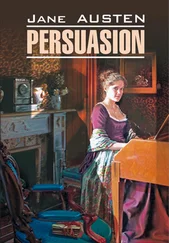Philip Hensher - Tales of Persuasion
Здесь есть возможность читать онлайн «Philip Hensher - Tales of Persuasion» — ознакомительный отрывок электронной книги совершенно бесплатно, а после прочтения отрывка купить полную версию. В некоторых случаях можно слушать аудио, скачать через торрент в формате fb2 и присутствует краткое содержание. Жанр: unrecognised, на английском языке. Описание произведения, (предисловие) а так же отзывы посетителей доступны на портале библиотеки ЛибКат.
- Название:Tales of Persuasion
- Автор:
- Жанр:
- Год:неизвестен
- ISBN:нет данных
- Рейтинг книги:4 / 5. Голосов: 1
-
Избранное:Добавить в избранное
- Отзывы:
-
Ваша оценка:
- 80
- 1
- 2
- 3
- 4
- 5
Tales of Persuasion: краткое содержание, описание и аннотация
Предлагаем к чтению аннотацию, описание, краткое содержание или предисловие (зависит от того, что написал сам автор книги «Tales of Persuasion»). Если вы не нашли необходимую информацию о книге — напишите в комментариях, мы постараемся отыскать её.
Tales of Persuasion — читать онлайн ознакомительный отрывок
Ниже представлен текст книги, разбитый по страницам. Система сохранения места последней прочитанной страницы, позволяет с удобством читать онлайн бесплатно книгу «Tales of Persuasion», без необходимости каждый раз заново искать на чём Вы остановились. Поставьте закладку, и сможете в любой момент перейти на страницу, на которой закончили чтение.
Интервал:
Закладка:
Fitzgerald read all of Timothy Storey’s emails, explaining all about her life – those details he had found so extraordinarily interesting and absorbing, so full of erotic promise. He found it hard to remember. There was absolutely nothing in these stilted statements that suggested she was anything but what she was; and Fitzgerald struggled to construct once more the image of the lonely, sensitive boy living in the middle of nowhere with four hearty hunting brothers; a boy with a dream of elegance, the interest in fashion a gift from the gods of Gay to the plains of Africa; a gift that would send him off to Europe in search of adventure and like-minded people. Fitzgerald had precisely envisaged a thin black boy, sitting up at nights, making ruffles. On the other hand, Timothy Storey had definitely never said, not in so many words, ‘By the way, I am not a boy.’
Some presence interrupted his thoughts, and Fitzgerald looked up. Over the thin screen and the MDF partition, on the hired workspace backing onto this one, was the face he had been looking for: was Eduardo’s.
‘Hello,’ Fitzgerald said, and the face looked blankly back at his, not sure that it had been spoken to. ‘Hello,’ Fitzgerald said again, less voicelessly. ‘We met. At Paddington Station. I’m a friend of Daniel’s.’
‘Oh, yes,’ Eduardo said. ‘Were you with a girl? Your girlfriend?’
‘No, not at all,’ Fitzgerald said. ‘It was a mistake, a big mistake. She’s not my girlfriend or anything.’
‘Yes, I remember now,’ Eduardo said. ‘Daniel told me you live near him, but he doesn’t know you.’
‘Well …’ Fitzgerald said: he would not normally insist on his friendship with Bradbury, but it was his only connection with Eduardo.
‘Listen,’ Eduardo said. ‘How do I make this thing work? It won’t switch itself on. I tried, and asked them, and they told me to try again, and it still doesn’t work. Can you show me?’
Fitzgerald was delighted. He moved smoothly round, pulling a chair up to sit close to Eduardo. He had a curious, marshy, wet-earth smell, like an animal, not at all unpleasant; where he sat he could feel the radiant, almost artificial warmth of Eduardo’s body. He took the little ticket from Eduardo, and typed the code into the box – that had not occurred to Eduardo to be the thing to do. The machine started up.
‘What do you do all day?’ Fitzgerald said, to prolong the moment.
‘Oh, I don’t know,’ Eduardo said. ‘I sit, and I watch TV, and maybe I listen to music, or I go on Daniel’s rowing machine, his running machine, I have a shower, and then it’s time for Daniel to come home, I guess.’
‘Do you ever go anywhere in London?’ Fitzgerald said. ‘If you’re here, you should definitely go and see the city. Did you ever go to Richmond Park? It’s beautiful – there are deer there, and the Isabella Plantation …’ He trailed off, struck by the ineptness of the offer.
‘No, I never go anywhere,’ Eduardo said. ‘I never heard of that park. Tomorrow, Daniel goes away to Paris with his job, for two nights, maybe, I don’t know, maybe I go then. He said to me too, “Why don’t you go to a museum, go to see some palace, fill your day?” but I don’t know. I don’t think I like to go to a museum, I never went to any museum in Argentina, except maybe at school.’
‘No,’ Fitzgerald said. ‘I wouldn’t recommend that to you, not if it’s not the sort of thing you wouldn’t take any enjoyment in.’
His sentences were growing inarticulate, struggling, vague, the utterances of a man who had learnt English as his third or fourth language, and had no rational sentiment to voice in that or any of the others.
The next day broke with sun through the thin curtains, and Fitzgerald was awake before seven; he had a sense of something to do, somewhere to go. He went through to his kitchen; from behind the door of the spare room, obscure rumbles and murmured syllables were emerging. Timothy Storey snored, and talked somewhat in her sleep, which extended until nine or later – he wondered what she had done on the veld, or whatever it was called in Kenya. He took a bath and dressed, and by eight was ensconced in a café at the corner of two main roads, sitting in a window, reading the newspaper. He believed that Daniel Bradbury usually left for work soon after dawn but perhaps, if he were going to Paris— Just then, in mid-speculation, he saw Bradbury’s silver Saab at the lights heading away from his flat, with Bradbury at the wheel.
At half past nine, Fitzgerald went to the gate of Bradbury’s converted school, and rang the bell of Bradbury’s flat. The long silence made him fear that Eduardo had gone out, but eventually the sleepy voice came over the intercom. Fitzgerald said his name; there was another pause, and then the gate buzzed open. ‘Oh, it’s you,’ Eduardo said, when Fitzgerald had gained access. He was standing on the landing, holding the door open with his bare foot; he was in a short silky dressing-gown going halfway down his brown thighs, hanging open to reveal a dark half-shaven chest. ‘Daniel’s gone, he’s gone to Paris. Did you want him? He didn’t say you were coming for anything. You woke me up.’
‘No,’ Fitzgerald said. ‘You told me Daniel was going to Paris, yesterday. I thought you might be bored. I’ve come to take you to Richmond Park.’
Eduardo considered the invitation, rubbed his sleepy fists into his eyes, like a cat. He seemed unenthusiastic. ‘The place with the deers,’ he said. ‘Oh, all right. Come back in half an hour.’
‘I could come in and wait,’ Fitzgerald said.
‘I have to shower,’ Eduardo said.
‘I could wait somewhere else while you do that,’ Fitzgerald said.
Eduardo considered this, then went back inside, leaving the door open. Fitzgerald took up this ambiguous invitation. The flat was what he had expected, the tall windows of the school, and the double-height ceiling, and it was entirely white. The sitting room was furnished with two identical giant black leather sofas, and on the main wall was an eight-foot-square painting-cum-screen-print of a flower some interior designer had concocted in the style of Andy Warhol. Fitzgerald walked about, examined all the photographs on the shelves. None, as far as he could see, included Eduardo just yet. He took a seat. In the recesses of a flat, a door clanged; the waters of a shower began to hiss.
When Eduardo presented himself, he was in holiday wear; a pair of white low-slung jeans, advertising the wares, and a sexily much-washed and faded black T-shirt. On his hairy, broad, flat feet, a pair of sandals identifying themselves as Versace. ‘OK,’ he said. ‘Where do we go?’
In the taxi to Sloane Square and the tube to Richmond, Eduardo was evasive, short-sentenced, hardly observing Fitzgerald’s company at all from behind his sunglasses. Fitzgerald made a couple of observations about passing objects, but then left it; some people, or so he believed, were not at their conversational best in the morning. At Earl’s Court, an acquaintance of Fitzgerald’s got on – one of his commissioning editors from way back, when Fitzgerald was still writing for gay magazines at a hundred pounds a pop. He stood in front of Fitzgerald, his eyes wandering constantly to Eduardo; the train was full, and it did not appear to occur to him that Fitzgerald could be accompanied by someone like Eduardo. When Eduardo said impatiently, ‘How many more stops?’ Fitzgerald introduced him; he noticed that Eduardo was just as brief with the editor, whose eyes were wandering back to Fitzgerald, perhaps considering whether he had missed something vital about Fitzgerald in the first place.
‘This is nice,’ Eduardo said, once in the park. ‘I like to walk.’ Over there was the white-icing façade of the royal lodge – or was it the ballet school – or White Lodge? Somewhere in the park was the Isabella Plantation. Fitzgerald remembered being taken to it, the dense displays of magnolia and rhododendron, whatever. He recalled walls of white and pink flowers; he did not think it was worth while dragging Eduardo about the place in search of somewhere so pensioner-friendly. Over there was a copse, heading the hill, and a single white cloud in the sky, quivering still on this warm morning. Eduardo flung himself down on the slope, made a single twisting gesture with his fists at either hipbone, and drew his T-shirt over his head. In the open air, there was the brief gust of that smell of Eduardo’s: clean, but animal, and suggestive to Fitzgerald. Eduardo screwed his T-shirt up into a pillow, and placed it beneath his head. Lying back, his torso was articulated like architecture. The twin lines headed downwards into his low-slung trousers as if towards the point of a V; they bracketed about his solid abdominal muscles, like the lines of a pendentive on a dome, lightly furred. Fitzgerald sat down too, drawing his knees up and hugging them tight.
Читать дальшеИнтервал:
Закладка:
Похожие книги на «Tales of Persuasion»
Представляем Вашему вниманию похожие книги на «Tales of Persuasion» списком для выбора. Мы отобрали схожую по названию и смыслу литературу в надежде предоставить читателям больше вариантов отыскать новые, интересные, ещё непрочитанные произведения.
Обсуждение, отзывы о книге «Tales of Persuasion» и просто собственные мнения читателей. Оставьте ваши комментарии, напишите, что Вы думаете о произведении, его смысле или главных героях. Укажите что конкретно понравилось, а что нет, и почему Вы так считаете.












